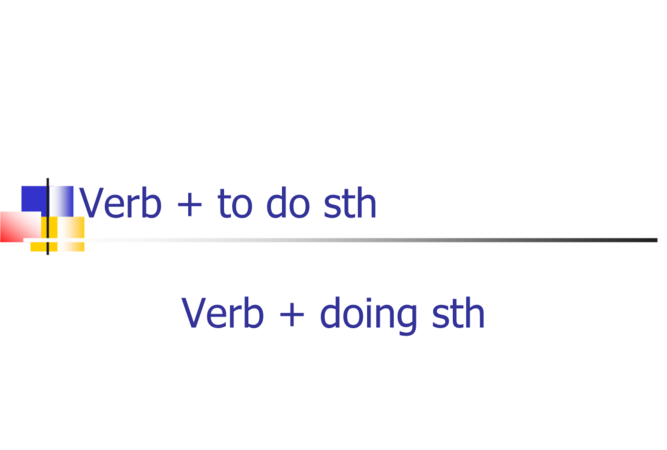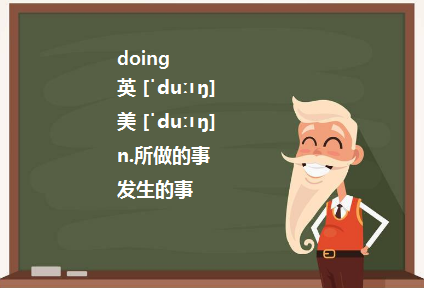本文目录
doing与todo的区别
1.finish, enjoy, feel like, consider,imagine, keep,postpone, dely,mind,practise, suggest,risk,quit+doing
2.1)forget to do 忘记要去做某事(此事未做)
forget doing忘记做过某事(此事已做过或已发生)
2)stop to do 停止、中断(某件事),目的是去做另一件事
stop doing 停止正在或经常做的事
3)remember to do 记住去做某事(未做)
remember doing记得做过某事(已做)
4) regret to do对要做的事遗憾
regret doing对做过的事遗憾、后悔
5)try to do努力、企图做某事
try doing试验、试一试某种办法
6) mean to do打算,有意要…
mean doing意味着
7)go on to do 继而(去做另外一件事情)
go on doing 继续(原先没有做完的事情)
8)propose to do 打算(要做某事)
proposing doing建议(做某事)
9) like /love/hate/ prefer +to do 表示具体行为;+doing sth 表示抽象、倾向概念
(注)如果这些动词前有should一词,其后宾语只跟不定式,不能跟动名词。例如:
I should like to see him tomorrow.
10) need, want, deserve +动名词表被动意义;+不定式被动态表示“要(修、清理等)”意思。
Don’t you remember seeing the man before?你不记得以前见过那个人吗?
You must remember to leave tomorrow.你可要记着是明天动身。
I don’t regret telling her what I thought.我不后悔给她讲过我的想法。(已讲过)
I regret to have to do this, but I have no choice.我很遗憾必须这样去做,我实在没办法。(未做但要做)
You must try to be more careful.你可要多加小心。
Let’s try doing the work some other way.让我们试一试用另外一种办法来做这工作。
I didn’t mean to hurt your feeling.我没想要伤害你的感情。
This illness will mean (your) going to hospital.得了这种病(你)就要进医院。
3.省to 的动词不定式
1) 情态动词 ( 除ought 外,ought to):
2) 使役动词 let, have, make:
3) 感官动词 see, watch, look at, notice , observe, hear, listen to, smell, feel, find 等后作宾补,省略to。
注意:在被动语态中则to 不能省掉。
I saw him dance.
=He was seen to dance.
The boss made them work the whole night.
=They were made to work the whole night.
4) would rather,had better:
5) Why… / why not…:
6) help 可带to,也可不带to, help sb (to) do sth:
7) but和except:but前是动词do时,后面出现的动词用不带to的动词不定式。
8) 由and, or和than连接的两个不定式,第二个to 可以省去:
9) 通常在discover, imagine, suppose, think, understand等词后,可以省去to be:
He is supposed (to be) nice. 他应该是个好人。
1)下面的动词要求不定式做宾语
attempt企图 enable能够 neglect忽视
afford负担得起 demand要求 long渴望
arrange安排 destine注定 mean意欲,打算
begin开始 expect期望 omit忽略,漏
appear似乎,显得 determine决定 manage设法
cease停止 hate憎恨,厌恶 pretend假装
ask问 dread害怕 need需要
agree同意 desire愿望 love爱
swear宣誓 volunteer志愿 wish希望
bear承受 endeavor努力 offer提供
beg请求 fail不能 plan计划
bother扰乱;烦恼 forget忘记 prefer喜欢,宁愿
care关心,喜欢 happen碰巧 prepare准备
decide决定 learn学习 regret抱歉,遗憾
choose选择 hesitate犹豫 profess表明
claim要求 hope希望 promise承诺,允许
start开始 undertake承接 want想要
consent同意,赞同 intend想要 refuse拒绝
decide决定 learn学习 vow起
contrive设法,图谋 incline有…倾向 propose提议
seek找,寻觅 try试图
2)下面的动词要求不定式做宾补:动词+宾语+动词不定式
ask要求,邀请 get请,得到 prompt促使
allow允许 forbid禁止 prefer喜欢,宁愿
announce宣布 force强迫 press迫使
bride 收买 inspire鼓舞 request请求
assist协助 hate憎恶 pronounce断定,表示
advise劝告 exhort告诫,勉励 pray请求
authorize授权,委托 help帮助 recommend劝告,推荐
bear容忍 implore恳求 remind提醒
beg请求 induce引诱 report报告
compel强迫 invite吸引,邀请, summon传唤
command命令 intend想要,企图 show 显示
drive驱赶 mean意欲,打算 train训练
cause引起 instruct指示 require要求
deserve应受 leave使,让 tell告诉
direct指导 like喜欢 tempt劝诱
entitle有资格 order命令 warn告诫
enable使能够 need需要 urge激励,力说
encourage鼓励 oblige不得不 want想要
condemn指责,谴责 lead引起,使得 teach教
entreat恳求 permit允许 wish希望
(2)有少数动词只能用动名词作宾语
acknowledge承认,自认 cease 停止 mention说到,讲到
admit 承认 tolerate忍受 dislike不喜欢,讨厌
advocate:提倡,主张 complete完成 dread可怕
appreciate 感激,欣赏 confess坦白 endure忍受
avoid避免 contemplate细想 enjoy享有,喜爱
bear忍受 defer拖延 envy嫉妒
can’t help不禁 delay延迟 escape逃跑,逃避
can’t stand受不了 deny否认 excuse借口
consider 考虑 detest嫌恶 fancy幻想,爱好
favor 造成,偏爱 mind 介意 repent悔悟
figure描绘,计算 miss错过 resent怨恨
finish完成,结束不得 pardon原谅,饶恕 resist抵抗,阻止
forgive原谅 permit 允许 resume恢复
imagine设想 postpone延迟,延期 risk冒险
involve卷入,包含 practise 实行,实践 suggest建议
hate讨厌 prevent阻止 save营救,储蓄
keep保持 quit放弃停止 stand坚持,忍受
loathe非常讨厌,厌恶 recall回想
例如:I appreciate having been given the opportunity to study abroad two years ago.我很感激两年前给我出国学习的机会。

是to do 还是 to be done
to do和doing的区别为:意思不同、用法不同、侧重点不同。
一、意思不同
1、to do:待办事项。
2、doing:所做的事,发生的事。
二、用法不同
1、to do:动词不定式,为非谓语动词。在英语语法中,动词不定式是指动词中的一种不带词形变化从而不指示人称、数量、时态的一种形式。它之所以被称做不定式,是因为动词不被限定,或者说不被词形变化所局限。不定式属于非谓语动词形式。

2、doing:动名词,指的是动词ing形式的一种,兼有动词和名词特征的非限定动词。它可以支配宾语,也能被副词修饰。动名词有时态和语态的变化。英语中的动名词是由动词变化而来。
三、侧重点不同
1、to do:侧重于表示想做但是还没做的事。
2、doing:侧重于表示正在做的事。
哪些动词后面只能加to do
首先是加to do 的动词
attempt企图 enable能够 neglect忽视
afford负担得起 demand要求 long渴望
arrange安排 destine注定 mean意欲,打算
begin开始 expect期望 omit忽略,漏
appear似乎,显得 determine决定 manage设法
cease停止 hate憎恨,厌恶 pretend假装
ask问 dread害怕 need需要
agree同意 desire愿望 love爱
swear宣誓 volunteer志愿 wish希望
bear承受 endeavor努力 offer提供
beg请求 fail不能 plan计划
bother扰乱;烦恼 forget忘记 prefer喜欢,宁愿
care关心,喜欢 happen碰巧 prepare准备
decide决定 learn学习 regret抱歉,遗憾
choose选择 hesitate犹豫 profess表明
claim要求 hope希望 promise承诺,允许
start开始 undertake承接 want想要
consent同意,赞同 intend想要 refuse拒绝
decide决定 learn学习 vow起
contrive设法,图谋 incline有…倾向 propose提议
seek找,寻觅 try试图
2)下面的动词要求不定式做宾补:动词+宾语+动词不定式
ask要求,邀请 get请,得到 prompt促使
allow允许 forbid禁止 prefer喜欢,宁愿
announce宣布 force强迫 press迫使
bride 收买 inspire鼓舞 request请求
assist协助 hate憎恶 pronounce断定,表示
advise劝告 exhort告诫,勉励 pray请求
authorize授权,委托 help帮助 recommend劝告,推荐
bear容忍 implore恳求 remind提醒
beg请求 induce引诱 report报告
compel强迫 invite吸引,邀请, summon传唤
command命令 intend想要,企图 show 显示
drive驱赶 mean意欲,打算 train训练
cause引起 instruct指示 require要求
deserve应受 leave使,让 tell告诉
direct指导 like喜欢 tempt劝诱
entitle有资格 order命令 warn告诫
enable使能够 need需要 urge激励,力说
encourage鼓励 oblige不得不 want想要
condemn指责,谴责 lead引起,使得 teach教
entreat恳求 permit允许 wish希望
(2)有少数动词只能用动名词作宾语
acknowledge承认,自认 cease 停止 mention说到,讲到
admit 承认 tolerate忍受 dislike不喜欢,讨厌
advocate:提倡,主张 complete完成 dread可怕
appreciate 感激,欣赏 confess坦白 endure忍受
avoid避免 contemplate细想 enjoy享有,喜爱
bear忍受 defer拖延 envy嫉妒
can’t help不禁 delay延迟 escape逃跑,逃避
can’t stand受不了 deny否认 excuse借口
consider 考虑 detest嫌恶 fancy幻想,爱好
favor 造成,偏爱 mind 介意 repent悔悟
figure描绘,计算 miss错过 resent怨恨
finish完成,结束不得 pardon原谅,饶恕 resist抵抗,阻止
forgive原谅 permit 允许 resume恢复
imagine设想 postpone延迟,延期 risk冒险
involve卷入,包含 practise 实行,实践 suggest建议
hate讨厌 prevent阻止 save营救,储蓄
keep保持 quit放弃停止 stand坚持,忍受
loathe非常讨厌,厌恶 recall回想
例如:I appreciate having been given the opportunity to study abroad two years ago.我很感激两年前给我出国学习的机会.
(3)有些动词后使用动名词和动词不定式作宾语的差别
1)forget to do 忘记要去做某事(此事未做)
forget doing忘记做过某事(此事已做过或已发生)
2)stop to do 停止、中断(某件事),目的是去做另一件事
stop doing 停止正在或经常做的事
3)remember to do 记住去做某事(未做)
remember doing记得做过某事(已做)
4) regret to do对要做的事遗憾
regret doing对做过的事遗憾、后悔
5)try to do努力、企图做某事
try doing试验、试一试某种办法
6) mean to do打算,有意要…
mean doing意味着
7)go on to do 继而(去做另外一件事情)
go on doing 继续(原先没有做完的事情)
8)propose to do 打算(要做某事)
proposing doing建议(做某事)
9) like /love/hate/ prefer +to do 表示具体行为;+doing sth 表示抽象、倾向概念
(注)如果这些动词前有should一词,其后宾语只跟不定式,不能跟动名词.例如:
I should like to see him tomorrow.
10) need, want, deserve +动名词表被动意义;+不定式被动态表示“要(修、清理等)”意思.
Don’t you remember seeing the man before?你不记得以前见过那个人吗?
You must remember to leave tomorrow.你可要记着是明天动身.
I don’t regret telling her what I thought.我不后悔给她讲过我的想法.(已讲过)
I regret to have to do this,but I have no choice.我很遗憾必须这样去做,我实在没办法.(未做但要做)
补充 动词加doing
1. feel like+V-ing 2. enjoy/like+V-ing 3. stop doing sth. 4. stop/prevent/keep from+V-ing
5. finish+V-ing 6. It’s another way of+V-ing 7. spend…( in )+V-ing 8. hear/see sb.+V-ing
9. be good at+V-ing 10. be busy+V-ing 11. be worth doing sth. 12. go / keep on+V-ing
13. What/How about doing sth. 14. Thanks for doing sth 15. prefer doing sth.. to doing sth.
16. forget doing sth. 17. remember doing sth. 18. instead of doing sth. 19. hate/dislike doing sth.
20. be used for doing sth. 21. be/become interested in doing sth. 22. Would you mind doing sth.?
23. have fun doing sth. 24. practise doing sth 25. better than doing ssth.
26. do well in+V-ing 27. 介词后面的动词要用V-ing形式,如:another way of doing sth.
28.动名词做主语用V-ing形式,如:Reading in bed is bad for your eyes.
TO的不定式短语和TO DOING短语
下列动词或词组后面都可以接doing:
admit 承认
appreciate 感激
avoid 避免
complete完成
consider认为
delay 耽误
deny 否认
detest 讨厌
endure 忍受
enjoy 喜欢
escape 逃脱
fancy 想象
finish 完成
imagine 想象
mind 介意
miss 想念
postpone推迟
practice 训练
recall 回忆
resent 讨厌
resume 继续
resist 抵抗
risk 冒险
suggest 建议
face 面对
include 包括
stand 忍受
understand 理解
forgive 宽恕
keep 继续
例如:Would you mind turning down your radio a little, please? 你把收音机音量调小一点,好吗
The squirrel was lucky that it just missed being caught. 这松鼠幸运得很,刚逃避了被逮住的厄运.
admit to
prefer…to
be used to
lead to
devote oneself to
object to
stick to
no good
no use
be fond of
look forward to
be proud of
be busy
can't help
be tired of
be capable of
be afraid of
think of
burst out
keep on
insist on
count on
set about
put off
be good at
take up
give up
be successful in
下列动词或词组都可以用不定式:
afford
aim
agree
arrange
ask
decide
bother
care
choose
demand
desire
determine
elect
endeavor
hope
fail
help
learn
long 渴望
mean
manage
offer
plan
pretend
refuse
tend
undertake
expect
hate
intend
例如:
The driver failed to see the other car in time. 司机没能及时看见另一辆车.
He offered to help me. 他表示愿意帮助我.
需要省略to的不定式的情况有:
1) 情态动词 ( 除ought 外) 后.
2) 使役动词 let, have, make后,感官动词 see, watch, look at, notice , observe, hear, listen to, smell, feel, find 等后.
注意:被动语态中不能省去to.例如:
I saw him dance. 我看见他跳舞.
=He was seen to dance.
The boss made them work the whole night. 老板让他们整夜干活.
=They were made to work the whole night.
3) would rather,had better句型后
4) Why… / why no…句型后
5) help 后可带to,也可不带to, help sb (to) do sth:
6) but和except后.but前是实义动词do时,后面出现的不定式不带to.
比较:He wants to do nothing but go out. 他只想出去玩.
He wants to believe anything but to take the medicine. 除了吃这药,他什么都信.
7) 由and, or和than连接的两个不定式,第二个to 可以省去:
8) 通常在discover, imagine, suppose, think等词后作宾补时,可以省去to be.例如:
He is supposed (to be) nice. 他应该是个好人.
一些重要的区分:
1) stop doing/to do
stop to do 停止,中断做某事后去做另一件事,stop doing 停止做某事.例如:
They stop to smoke a cigarette. 他们停下来,抽了根烟.
I must stop smoking. 我必须戒烟了.
2)forget doing/to do
forget to do 忘记要去做某事,forget doing 忘记做过某事.例如:
The light in the office is stil on. He forgot to turn it off. 办公室的灯还在亮着,他忘记关了.(没有做关灯的动作)
He forgot turning the light off. 他忘记他已经关了灯了.(已做过关灯的动作)
3)remember doing/to do
remember to do 记得去做某事,remember doing 记得做过某事.例如:
Remember to go to the post office after school. 记着放学后去趟邮局.
Don't you remember seeing the man before? 你不记得以前见过那个人吗?
4)regret doing/to do
regret to do 对将要做的事遗憾,regret doing 对做过的事遗憾、后悔.例如:
I regret to have to do this, but I have no choice. 我很遗憾必须这样去做,我实在没有办法.
I don't regret telling her what I thought. 我不为告诉她我的想法而后悔.
5)cease doing/to do
cease to do 长时间,甚至永远停做某事,cease doing 短时停止做某事,以后还会接着做.例如:
That department has ceased to exist forever. 那个系已不复存在.
The girls ceased chatting for a moment when their teacher passed by. 姑娘们在老师走过时,停了会聊天
6)try doing/to do
try to do 努力,企图做某事,try doing 试验,试着做某事.例如:
You must try to be more careful. 你可要多加小心.
I tried gardening but didn't succeed. 我试着种果木花卉,但未成功.
7)go on doing/to do
go on to do 做了一件事后,接着做另一件事,go on doing 继续做原来做的事.例如:
After he had finished his maths,he went on to do his physics. 做完数学后,他接着去做物理.
Go on doing the other exercise after you have finished this one. 作完这个练习后,接着做其他的练习
8)be afraid doing/to do
be afraid to do 不敢,胆怯去做某事,是主观上的原因不去做,意为"怕",be afraid of doing 担心出现doing的状况、结果.doing 是客观上造成的,意为"生怕,恐怕".例如:
She was afraid to step further in grass because she was afraid of being bitten by a snake.
她生怕被蛇咬着,不敢在草丛中再走一步.
She was afraid to wake her husband. 她不敢去叫醒她丈夫.
She was afraid of waking her husband. 她生怕吵醒她丈夫.
9)be interested doing/to do
interested to do 对做某事感兴趣,想了解某事,interested in doing 对某种想法感兴趣,doing 通常为想法.例如:
I shall be interested to know what happens. 我很想知道发生了什么事.(想了解)
I'm interested in working in Switzerland. Do you have any idea about that?
我对在瑞士工作感兴趣.你想过这事吗? (一种想法)
10) mean to doing/to do
mean to do 打算、想,mean doing 意味着.例如:
I mean to go, but my father would not allow me to. 我想去,但是我父亲不肯让我去.
To raise wage means increasing purchasing power. 增加工资意味着增加购买力.
11)begin(start) doing/to do
begin / start to do sth /begin / start doing sth.
a) 谈及一项长期活动或开始一种习惯时,使用doing.例如:
How old were you when you first started playing the piano? 你几岁时开始弹钢琴?
b) begin, start用进行时时,后面动词用不定式to do.例如:
I was beginning to get angry.我开始生起气来.
c) 在attempt, intend, begin, start 后接know, understand, realize这类动词时,常用不定式to do.例如:
I begin to understand the truth.我开始明白真相.
d) 事物作主语时.例如:
The snow began to melt.雪开始融化了
12)感官动词 + doing/to do
感官动词 see, watch, observe, notice, look at, hear, listen to, smell, taste, feel + do表示动作的完整性,+doing 表示动作的进行性.例如:
I saw him work in the garden yesterday. 昨天我看见他在花园里干活了.(强调"我看见了"这个事实)
I saw him working in the garden yesterday.(强调"我见他正干活"这个动作)昨天我见他正在花园里干活

英语中的n.v.adj.adv.分别代表什么?
动词加to do和doing的区别是:读音不同、含义不同、用法不同
一、读音不同
to do
读音:英 [tu duː] 美 [tu duː]
doing
读音:英 [ˈduːɪŋ] 美 [ˈduːɪŋ]
二、含义不同
to do
释义:是一般将来式,是打算去做什么。
doing
释义:是现在进行式,是现在正在做什么。
三、用法不同
to do
用法:
1.forget to do是忘记做某事(还没做)。
2.try to do是尽力去做隐含有不成功的意思。
3.like to do是喜欢做某事(暂时的,在特定的环境下)。
doing
用法:
1.forget doing是忘记做过的某事(已做过)。
2.try doing是尝试做,看看是否有成效,隐含成功的意思。
3.like doing是喜欢做某事(长久的,一直以来都很喜欢的)。

扩展资料
不定式to do和动名词doing作宾语的区别,英语中大多数动词既可跟不定式,也可跟动名词作直接宾语,但有些动词要求:
一、不定式做宾语和宾语补足语。
1.动词要求不定式做宾语:attempt企图
例句:The only time that we attempted to do something like that was in the city of Philadelph.
译文:只有在费城那次我们曾试着做那样的事。
2.动词要求不定式做宾补,动词+宾语+动词不定式:ask要求
例句:We had to ask him to leave.
译文:我们不得不要求他离开。
二、动名词做宾语和宾语
有少数动词只能用动名词作宾语:dislike不喜欢,讨厌
例句:I dislike him because he is too garrulous.
译文:我之所以讨厌他是因为他的嘴太贫。
以上就是关于loathe to do还是doing ,doing与todo的区别的全部内容,以及loathe to do还是doing 的相关内容,希望能够帮到您。
